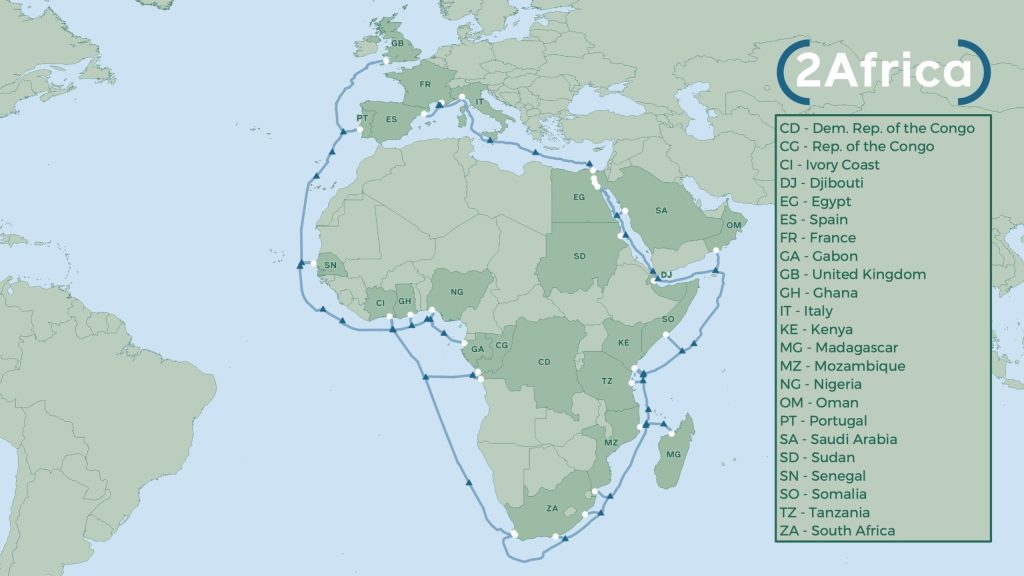
(CNN)Upon his first — and unannounced — visit to Nigeria in 2016, Facebook’s founder Mark Zuckerberg met with developers in Lagos, pushing startup enthusiasm and sparking new interest in innovative companies in the region.Now, four years later, the social media giant recently announced that the first Facebook office will open in the second quarter of 2021 in Lagos, further solidifying the area’s reputation as “Nigeria’s Silicon Valley.”Facebook also unveiled more details on its expansion plans to tap into Africa’s 1.2-billion-person market, including new tech hubs for startup development and the construction of 37,000 kilometers of underwater internet cable, which will encircle the entire continent.
Facebook is constructing 37,000 kilometers of underwater internet cable, which will encircle the entire African continent.CNN’s Eleni Giokos spoke with Facebook’s regional director for Africa, Nunu Ntshingila, to break down how the company has been fostering a growing audience and what the expectations are for the platform on the African continent.This interview has been edited and condensed for clarity.Eleni Giokos: The pandemic has certainly taught us that we don’t necessarily need to be at the office physically every day. Has Facebook got a global strategy to get people back to the office in the future?Nunu Ntshingila: I think we have seen ups and downs, and I think right at the beginning we saw a lot of people were quite excited about working from home. We’ve also started to see the unintended consequences. And this is a global phenomenon. How do we make sure that this is not a sprint? This is a marathon.
This is something that Mark Zuckerberg has spoken a lot about — the idea that actually we could look into many areas of the world for talent. And I think that is a very positive outcome of the period that we’ve just gone through.EG: How much has Facebook grown since then the opening of the first hub in sub-Saharan Africa?NN: In sub-Saharan Africa alone, we’ve grown by over 50 million over time. These are new users that are coming to use our platform very differently. These are businesses that are now coming on to our platform to grow their own businesses and finding new customers. So yes, we have seen an exponential growth in terms of users, just across our entire set of platforms — whether it’s Facebook, Instagram, WhatsApp, and Messenger.See more: Africa’s most anticipated architecture projectsEG: It’s almost a vote of confidence that Lagos is going to be one of the most important tech startup cities on the continent. Is that what you’re expecting?NN: We are already seeing that right now. We’ve made this investment because we already see how active the startup community is there. We’ve got one of the largest developer ecosystems based out of that market. We felt that it is actually important for us to make sure that the talent hub grows and that we continue to build out our neighbors.
EG: Connectivity was one of the biggest challenges. And I know that you’ve been part of laying one of the longest cables bringing the internet to the continent, increasing bandwidth in Africa. Would you say that was part of the most important mandate in terms of ensuring that you increase users?NN: The single biggest barrier to entry is that of connectivity. This is a partnership with a lot of our global telco partners, whereby we are going to build a sea cable that will go around the whole continent. And we anticipate that this will be completed by 2023. What we are trying to do is to expand 4G access, 5G access and broadband to millions more people than we are currently servicing today. The sea cable is going to be landing in 16 countries. And once it’s completed it’ll be the largest subsea cable to go around the continent.EG: How important is the African market for Facebook?NN: We believe that Africa will continue to play a significant role for Facebook into the future. This is one of the youngest continents in the world. If you just think about it, there’s 1.2 billion people in this region, there’s a lot of people that we continue to serve. we are excited to see how Facebook is going to develop going forward. I’ve been very lucky to work in this region and begin to develop what Facebook will look like into the future. And up until now, it’s been an incredible ride.